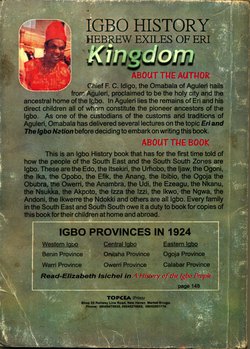Читать книгу Igbo History Hebrew Exiles of Eri - Omabala Aguleri - Страница 12
На сайте Литреса книга снята с продажи.
The Origin of Igbo: Metaphysics To Science, (Onwuejeogu 1987)
ОглавлениеAccording to Professor M. Angulu Onwuejeogu, Professor of Anthropology, University of Benin, “Many scholars have attempted to speculate on the origin of the Igbo. Some have argued that the migration of the Igbo was southwards from some assumed centre in the north. This is generally termed the northern common centre theory. According to this theory, five North centre areas are postulated: namely, the Semitic centre in the Near and Far East, the Hermitic, centre around Egypt and Northern Africa, the West-Saharan Centre, the Chaldia centre and the Nok centre. “I argue that the problem is not so simple.
Here I shall pull other ideas together into the North centre theory. In analyzing origins, two general theories are usually pursued: the theory of permanentism or creationist theory and the theory of evolution.
The theory of permanentism or creationist theory is fully demonstrated from two sources: the traditional ethnometa-physical sources as stored up in the oral tradition of African peoples. The other source of origin is the documented creationist theory in the Bible or Koran or other sacred books. Many Igbo scholars who read the Bible have tried to link up with the lost tribe of Israel. Some argue that Igbo culture has some remarkable similarities with that of ancient Hebrew. On the basis of such similarity the scholars establish common origin and argue that the Igbo broke away and migrated southwards. This is of course a version of the Semitic theory. Using the Bible genealogy of Jesus, from Adam to Jesus...”
The evolutionary theory seems to have a scientific edge over the creationist theory which is based on metaphysical speculation and faith. The logic of evolution is attested through several empirical observations and analysis of fossil and artifacts accidentally found or archaeologically excavated the distribution of such finds, their diffusion and relationship with other finds and the possibility of dating the finds with techniques such as relative stratigraphy, potassium argon, carbon 14, uranium helium and dendrochronology. Where possible these dating systems are correlated with the solar or lunar dating system like the type based on the Christian and Muslim calendars respectively.
I wish to emphasize that the evolutionary history of Igbo culture and civilizations can only be fully understood in the context of the cultures and civilizations of the African continent. For the early beginnings of man’s existence in the theatre of Igboland, we rely on archaeological, anthropological, and linguistic evidences of man’s activities in Igboland.
Four of the archaeological finds in Igboland become very relevant: the Ugwuele, Afikpo, Nsukka and Igbo-Ukwu. These four sites have produced abundant and irrevocable evidence of the fact that at least between 100, 000 B.C and 5000 B.C man has started his cultural drama in what I refer to as the theatre of Igboland. The problem is: are they Igbo as we know them today? Professor Onwuejeogu sought to answer to this question by applying the anthropological-linguistic evidence based on grotto chronology, which puts the date of the emergence of Igbo Language from the Proto-Niger languages of about 6000 B.C., and lexicostatistics, which suggests the relative degree of difference of verities of Igbo languages spoken today. He went on to say that using grotto chronology one can say that by 6000 B.C. the Igbo man had emerged ready to be transformed to what is today.
